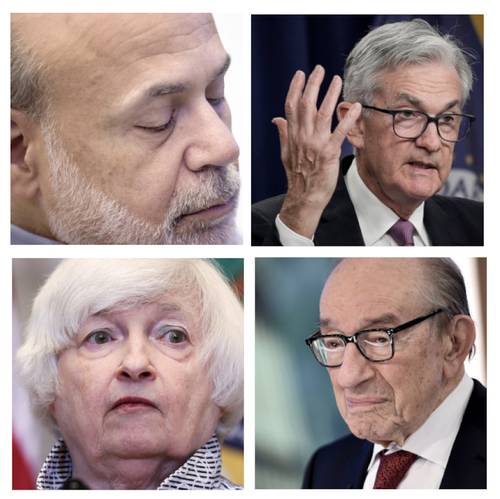Taibbi: The People Versus The Unelected
Authored by Matt Taibbi via TK News,
Review of The Lords of Easy Money, by Christopher Leonard, Simon and Schuster, 384 pages
Click here for Q&A with the author.
In Chicago on July 8, 1896, a former Nebraska congressman named William Jennings Bryan strode onstage at the Democratic National Convention and delivered one of the most famous speeches in American history. A populist and free silver advocate, Jennings stood in opposition to the Wall Street-backed Republican Party, which sought more power for creditors by supporting a gold standard. “You shall not press down upon the brow of labor this crown of thorns,” Bryan thundered, to close his address. “You shall not crucify mankind upon a cross of gold.”
Bryan’s speech can feel inaccessible today because it belonged to an era when “managing the money supply was still in the public realm of democratic action,” as author Christopher Leonard puts it in his remarkable book The Lords of Easy Money. The fights that now take place in the secrecy of the Federal Reserve were then a near-constant concern of congress and a source of bitter conflict between east and west, rich and poor, city-dwellers and farmers. Silver dollars had the de facto impact of increasing the money supply and making farm or prospecting debt easier to repay, while the “organized wealth” Bryan opposed sought a gold standard to keep returns on those loans high. The “Cross of Gold” speech came just after a Great Financial Panic in 1893, and though he would lose to William McKinley, Bryan set the terms for generations of controversies about who got to control the levers of finance.
On May 15, 2010, at a similar juncture a few years removed from a financial crash, a little-known Federal Reserve Bank president from Kansas City named Thomas Hoenig gave a controversial interview to the Wall Street Journal, called “The Fed’s Monetary Dissident.” Hoenig spoke as the economy was pulling out of the 2008 emergency, and as a voting member of the Federal Open Market Committee or FOMC, which helps set interest rates, he took the rare step of publicly disagreeing with peers. “We’ve gotten through the crisis,” he said. “We ought to be thinking about the long run.” Hoenig violated an unspoken taboo, reminding readers that the Fed’s work isn’t just a technocratic process, but “also an allocative policy,” i.e. one that helped pick society’s economic winners and losers — the stuff of politics.
Under the leadership of its soft-spoken, bearded, nebbishy new chairman Ben Bernanke, the central bank had just undertaken the financial equivalent of a Normandy invasion in response to the 2008 crash, adding $1.2 trillion to the money supply in two years, or more than it had in total in every year between 1913 and 2008. Hoenig was concerned because instead of taking early signs of recovery as a chance to pull back, Bernanke was pouring more troops into theater, flooding the economy with money with plans to keep borrowing rates at or near zero for “an extended period” (it would turn out to be ten years). Hoenig worried the Fed was addicting Wall Street to cheap cash, upsetting the delicate balance of financial power he’d spent a life trying to maintain. “I can’t guarantee the carpenter down the street a margin,” he said. “I really don’t think we should be guaranteeing Wall Street… by guaranteeing them a zero or near zero interest rate environment.”
Hoenig’s clipped remarks didn’t land with the fanfare of Bryan’s grandiloquent oratory. In fact, it’s hard to imagine two men with less in common, stylistically. Hoenig was and is a reserved former soldier and number-cruncher who disdained limelight and believed in economy in all things, including words, while Bryan was a man born for the soapbox. Moreover, in a misdiagnosis that that persists to this day, Hoenig’s remarks were criticized as the tightwad meanderings of a hard-money reactionary, an impression that grew stronger when “The Fed’s dissident” was lionized in congressional hearings by the likes of “End the Fed” campaigner and gold-standard advocate Ron Paul. If Bryan wanted to loosen the money supply, and Hoenig wanted to rein it in, what linked them? What could American history’s prototype populist possibly share with a fusty economic traditionalist like Hoenig?
In fact there were similarities. Hoenig’s critics tended to see things backwards, pegging beliefs of his we’d now recognize as economic populism as conservatism, and more importantly mis-labeling the bank-friendly, trickle-down policies of Bernanke as liberal progressivism. This radical switcheroo, turning traditional perceptions of liberalism and conservatism on their head, soon spread to non-financial arenas, as elite officials pitched themselves as progressives, deriding opponents as conspiracist reactionaries. Hoenig is essentially patient zero of this phenomenon, and his story is explained brilliantly in The Lords of Easy Money, in my mind the first book that makes the inner workings of the Fed truly accessible to ordinary readers.
Leonard gets particularly high marks because the Fed — whose officials always used dullness and inscrutability to deflect public scrutiny — is nearly impossible to make interesting and understandable. Leonard pulls it off. A neophyte will come away from The Lords of Easy Money understanding the mechanics of money creation, and the bank’s awesome influence in widening the wealth gap and driving political divisions.
Subscribers can read more here…
Tyler Durden
Wed, 09/07/2022 – 22:45

